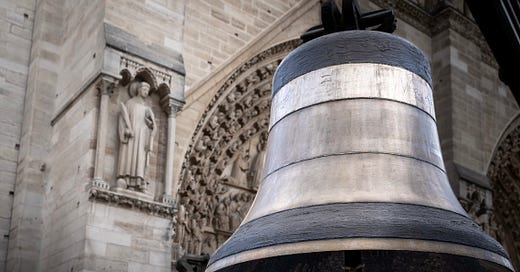As Donald Trump, Emmanuel Macron and other world leaders gather in Paris on Saturday at 7pm for the re-opening of Notre Dame Cathedral, bells in Catholic Churches across the United States will begin ringing in unison, led by the Basilica of the National Shrine of the Immaculate Conception in Washington DC.
While many will be focused on the architectural grandeur of France’s historic church, I will be thinking of this quote by Catholic philosopher Josef Pieper:
“The bells of Notre Dame,” he wrote, “were never really intended to serve the purpose of announcing the time or transmitting information. At least this was not their primary purpose, for if it had been, the invention of the wristwatch would have rendered them obsolete. No, these bells always were and still are a nonverbal form of rejoicing.”
A “non-verbal form of rejoicing” - the idea that some things are created for the sheer joy of it, not because they are useful but because they represent a fundamental part of our human nature which seeks celebration and enchantment.
Pieper, a German writing after World War II, said it was vital for human beings to recognize that at our core, our nature, is not to be “workers” but to be “worshippers” in the sense of recognizing and celebrating something greater than us. It is a distinctly human characteristic.
Pieper proposed his radical thesis in a talk entitled Leisure the Basis of Culture at a time when Germany was consumed by plans for re-building its nation after the material and cultural devastation of the war.
Culture, Pieper proposed, could not flourish in any society which did not recognize that there was more to being human than just being productive and providing for our material needs. Leisure, a concept which he took from ancient Greece, means the ability, “to look beyond the limits of our social and functional station to contemplate and celebrate the world as such to become and be that person who is essentially oriented toward the whole of reality.”
In the United States today we are faced with various challenges to our idea of what being human is all about: the imminent prospect of AI robots which forces us to consider just what is the difference between us and them; division created by our narrow boxes of identity politics; confusion about our most basic categories of man and woman, mother and child.
In this cultural context, the incoming administration of Donald Trump, JD Vance, Elon & Vivek are hailing a new era of worker efficiency & technological strength for America.
It seems a propitious moment, then, to put forth once again the radical idea that in an age of workers and technology, we need more than ever to recognize that we are also, and even primarily, people made for rest and rejoicing. Humans are not ever-advancing machines hurtling towards a new bright future but people rooted in rituals who ponder meaning, make music and celebrate mystery.
The rituals and celebrations of Christmas just before the inauguration of a new American political administration in January might be a good “inflection moment” to consider some of our deeper philosophical assumptions.
Leisure today means almost the opposite of what the Greeks had in mind. It is not about vacations or extra time for the gym nor can it be laid out in an easy ten-step plan. It is mistakenly considered the domain of the rich or lazy. For a Catholic like Pieper, leisure finds its ultimate purpose in the worship of God, but it is a theory which can also have non-religious resonance.
We might call it a mindset: a recognition that part of what it means to be human is to be able to rise above the workaday world and artificial identities and partake in that part of life which serves no purpose other than collective joyful celebration – like listening to bells.
The opposite of leisure is a totalitarian world of work; this is the danger of Marxist currents which see humans only in terms of their economic categories and productive output.
The opposite of leisure is also idleness – and this is one of the beautiful insights of Pieper:
“Leisure is only possible in the assumption that man is not only in harmony with himself (whereas idleness is rooted in the denial of this harmony) but also that he is in agreement with the world and its meaning. Leisure lives on affirmation.”
Now is the time to take back contemplation, that has been so egregiously eschewed by our distracted minds. To speak up for learning for learning’s sake at our universities, for beauty over function in our cities, for rest instead of rush, and all the other thousands of ways we humans can experience our harmony with the world and say that it is good.
When the bells of Notre Dame and churches around the world ring out once again this weekend in their “non-verbal rejoicing” may we be and become people capable of rejoicing along with them.




